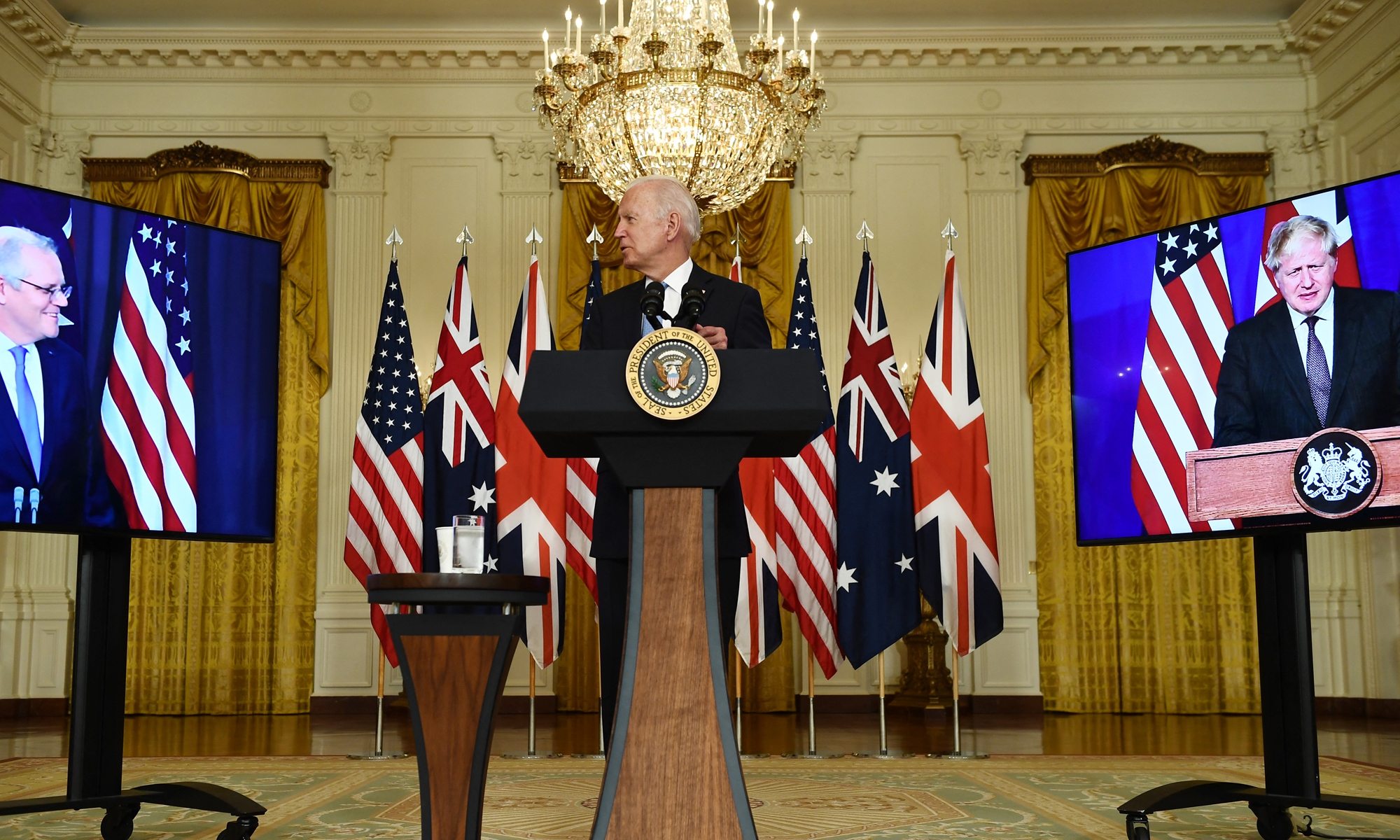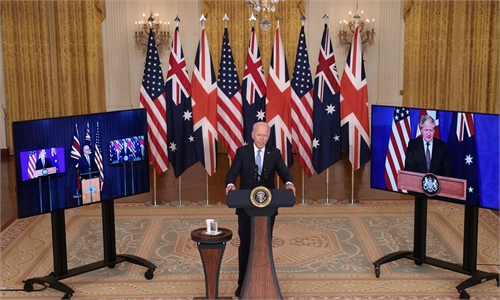Nuke sub deal could make Australia 'potential nuclear war target'
AUKUS puts Australia in danger, Morrison’s ambition to ‘bring disaster’

US President Joe Biden participates in a virtual press conference on national security in the White House in Washington, DC, on Wednesday US time, with British Prime Minister Boris Johnson (right) and Australian Prime Minister Scott Morrison in attendance via video link. Biden announced that the US is forming a new Indo-Pacific security alliance with the UK and Australia. Photo: AFP
The US, UK and Australia have announced a new alliance named "AUKUS" to target China, and they even made a deal to provide nuclear submarines to Australia. Chinese military experts warned that such a move will potentially make Australia a target of a nuclear strike if a nuclear war breaks out even when Washington said it won't arm Canberra with nuclear weapons, because it's easy for the US to equip Australia with nuclear weapons and submarine-launched ballistic missiles when Australia has the submarines.
According to a White House statement released on Wednesday US time, US President Joe Biden announced the new alliance together with Australian Prime Minister Scott Morrison and Prime Minister Boris Johnson via video link. However, Politico said "AUKUS" is Washington's newest, hottest acronym — "an ugly mashup of abbreviations for Australia, the United Kingdom and the United States."
Chinese Foreign Ministry spokesperson Zhao Lijian said the AUKUS deal supplying Australia with nuclear submarines "seriously damages regional peace and stability, intensifies the arms race, and undermines the Treaty on the Non-Proliferation of Nuclear Weapons."
Close attention
The new alliance of three English-speaking Anglo-Saxon countries is not a surprise as they share closer strategic ties with one another than with other Western countries, and this is why France's deal of submarines was canceled by Australia as Canberra can get the nuclear ones from Washington and London, said analysts, stressing that this alliance driven by the Cold War mentality and extreme hostility against China could seriously worsen the security situation in the Asia-Pacific region.
Li Haidong, a professor at the Institute of International Relations of China Foreign Affairs University, told the Global Times on Thursday that AUKUS is at the core of the US alliance system to contain China with extreme hostility, and it should not be underestimated. If Donald Trump or a Trump-like president returns to the White House one day, this alliance could bring unpredictable and catastrophic consequences.
"The US is using the same approach employed to contain Russia in Europe after the Cold War to contain China in the Asia-Pacific region. Washington is building a NATO-like alliance in the region, with AUKUS at the core, and the US-Japan and US-South Korea alliances surrounding it, and the Quad at the outermost level, because India, not an US ally, can't be trusted by the US," Li said.
These small groups of alliances can realize mutual reliance and form a big alliance led by the US to contain China. "So the threat and challenge that China is being confronted with are critical and serious. Russia can only realize effective communication with the West on its reasonable security concerns through intense conflicts. In the future, China should avoid a similar situation," Li stressed.
Zhao told the press briefing that "China will pay close attention to the development of the AUKUS deal. Relevant countries should abandon their Cold War and zero-sum game mentality; otherwise, they will lift a rock that drops on their own feet."
Nuclear threat
The most shocking and dangerous message about AUKUS is the US and the UK will provide nuclear submarines to Australia. Morrison said at the virtual joint statement that "The first major initiative of AUKUS will be to deliver a nuclear-powered submarine fleet for Australia. Over the next 18 months, we will work together to seek to determine the best way forward to achieve this. This will include an intense examination of what we need to do to exercise our nuclear stewardship responsibilities in Australia."
Biden also said at the virtual joint press conference with Morrison and Johnson that "we are launching consultations with Australia's acquisition of conventionally armed, nuclear-powered submarines for its navy - conventionally armed."
A senior Chinese military expert who requested anonymity told the Global Times on Thursday that at present, only nuclear-armed countries have nuclear submarines, and a nuclear submarine is one tasked to launch a second-round nuclear strike in a nuclear war.
So when Australia acquires such weaponry and technology, the country will potentially pose a nuclear threat to other countries, "because it's easy for the US and the UK to deploy nuclear weapons and submarine-launched ballistic missiles on the Australian submarines if they believe it's necessary, and Biden and Morrison's promises of 'not seeking nuclear weapons' are meaningless," the expert said.
This would make Australia a potential target for a nuclear strike, because nuclear-armed states like China and Russia are directly facing the threat from Australia's nuclear submarines which serve US strategic demands. Beijing and Moscow won't treat Canberra as "an innocent non-nuclear power," but "a US ally which could be armed with nuclear weapons anytime," the expert said, stressing that AUKUS is putting Australia in danger, and Morrison's ambition could bring destructive consequences to his country if a nuclear war breaks out.
If Australia, as a non-nuclear arms signatory of the non-proliferation treaty and a signatory of the South Pacific Nuclear Free Zone Treaty, imports nuclear submarine technology, which has strategic military value, its neighbors and the international community have reason to question its sincerity in fulfilling the treaties, Zhao said at the press conference on Thursday.
Morrison on Thursday also extended an "open invitation" for talks with the top Chinese leader, after announcing the AUKUS pact and the nuclear submarine deal that have seriously offended and provoked China. Chinese experts said such a hilarious and shameless act by Morrison can bring no positive response from China, and they have no expectations to fix China-Australia ties during the Morrison administration.
Zhao said, "I'm not aware of the relevant situation. I want to reaffirm that… Australia should take full responsibility for the current difficult situation in China-Australia relations," and Australia should seriously consider whether to treat China as a partner or a threat.
Chen Hong, director of the Australian Studies Center at East China Normal University in Shanghai, told the Global Times on Thursday that China has never treated Australia as a strategic threat or military rival, but Australia has made hostile moves again and again to treat China - its major trade partner - as an enemy. Unfortunately, deploying nuclear submarines will force China to change its attitude toward Australia, and China will also be forced to make changes in its military deployment and countermeasures following Australia's latest move.
The Morris administration has tried very hard to make up a "fake story" - China is the one who refuses to talk to Australia - "and such a shameless and nonsensical approach can bring China-Australia ties nowhere, because if Australia really wants to talk, it can fix their mistakes to win China's response instead of shouting all over the world that 'we want to talk to China!'" Chen said.
"If Morrison and his officials really want to talk, here is a piece of advice: He can come to attend the Beijing Winter Olympic Games in 2022, because China has sent invitations to leaders all around the world. If Morrison really wants to fix ties, he can show support to the Games and come to Beijing. I don't know whether this would bring China-Australia ties back on track or not, but he will surely meet the Chinese leaders and have a talk at least," Chen noted.
Increasing worries
Some Australian strategists and politicians also share similar concerns. And New Zealand, another member of the Five Eyes Alliance, is also aware of the danger from the new AUKUS pact and wants to stay away from it, especially Australian nuclear submarines.
New Zealand Prime Minister Jacinda Ardern said on Thursday that Australia's new nuclear-powered submarines would not be allowed in New Zealand's territorial waters under a long-standing nuclear-free policy, the Sydney Morning Herald reported on Thursday.
Australian National University defense and strategic studies analyst Hugh White said the nuclear submarine deal "is a very big deal, indeed, full of risks and changes the way Australia approaches the region," he told ABC radio on Thursday.
White said it would be seen as further proof that Australia had sided with the US in the face of a rising China. "It will further amplify the already very loud signals that are being sent that we are seeing a new Cold War in Asia," he said.
AUKUS would serve American interests by giving a key ally stronger submarine capacity in the Pacific, he added.
"In the escalating rivalry between America and China, we're siding with the United States and we're betting they are going to win this one," White said.
"But the fact is, that when we look 10 or 20 years ahead, I don't think we can assume the United States is going to succeed in pushing back effectively against China," White said.
The Sydney Morning Herald also said in a report on Thursday that prominent academics and former politicians like former Australian prime minister Paul Keating "have argued that Australia needs to assert more independence from America and avoid antagonizing China, its biggest trading partner. Such calls have been ignored: the AUKUS partnership confirms that Australia is going all the way with the US in what many have labeled a new 'cold war' with China."


